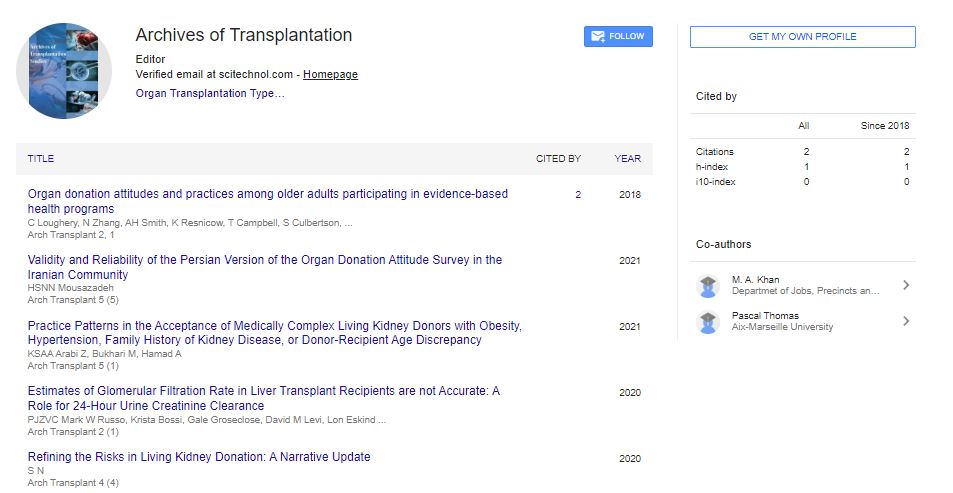Opinion Article, Arch Transplant Vol: 7 Issue: 3
Exploring the Role of Telemedicine in Post-Transplant Care
Dina Elinor*
1Department of Hematology and Bone Marrow Transplantation, Vita-Salute San Raffaele University, Milan, Italy
*Corresponding Author: Dina Elinor,
Department of Hematology and Bone
Marrow Transplantation, Vita-Salute San Raffaele University, Milan, Italy
E-mail: elinordin56@gmail.com
Received date: 02 September, 2023, Manuscript No. AT-23-116166;
Editor assigned date: 04 September, 2023, PreQC No AT-23-116166(PQ);
Reviewed date: 18 September, 2023, QC No AT-23-116166;
Revised date: 25 September, 2023, Manuscript No AT-23-116166(R);
Published date: 05 October, 2023, DOI: 10.4172/AT.1000149.
Citation: Elinor D (2023) Exploring the Role of Telemedicine in Post-Transplant Care. Arch Transplant 7:3.
Description
Organ transplantation has significantly improved the prognosis and quality of life for individuals with end-stage organ failure. However, the success of transplantation relies not only on the surgical procedure but also on comprehensive post-transplant care. This care involves monitoring graft function, managing immunosuppressive medications, and addressing potential complications. Traditionally, post-transplant care has required frequent in-person visits, often posing logistical and financial burdens on patients.
Telemedicine, which encompasses remote healthcare delivery using telecommunications technology, presents a promising solution to these challenges. It enables healthcare providers to monitor patients, deliver care, and educate them without the need for physical presence. The diverse applications of telemedicine in post-transplant care, emphasizing its potential to improve patient outcomes and enhance the efficiency of healthcare delivery.
Applications of telemedicine in post-transplant care
Remote monitoring: Telemedicine allows continuous monitoring of vital signs, graft function, and medication adherence. Remote sensors and wearable devices can provide real-time data to healthcare providers, enabling early detection of complications.
Virtual consultations: Transplant recipients can consult with healthcare providers through video conferencing, reducing the need for frequent clinic visits. This promotes timely interventions and patient engagement in their care.
Medication management: Telemedicine facilitates medication management through secure electronic communication. Providers can adjust immunosuppressive drug regimens based on patients' lab results and clinical status, optimizing therapy.
Patient education: Educational materials, webinars, and online support groups empower transplant recipients to take an active role in their care. Telemedicine platforms facilitate easy access to educational resources.
Benefits of telemedicine in post-transplant care
Improved access to care: Telemedicine eliminates geographical barriers, ensuring that patients in remote areas or those with mobility limitations can access specialized post-transplant care.
Enhanced patient engagement: Telemedicine encourages patients to actively participate in their care, leading to better adherence to medication regimens and lifestyle modifications.
Timely intervention: Remote monitoring and virtual consultations enable prompt identification and management of complications, reducing hospital readmissions and graft rejection rates.
Cost savings: Telemedicine can reduce the financial burden on patients by minimizing travel expenses associated with clinic visits and hospitalizations.
Technology barriers: Not all patients have access to the necessary technology or possess the digital literacy required for telemedicine, potentially leading to disparities in care.
Regulatory and reimbursement issues: Telemedicine regulations and reimbursement policies vary by region, making it essential to navigate legal and financial considerations when implementing telemedicine programs.
Data security and privacy: Protecting patient data and ensuring Health Insurance Portability and Accountability Act (HIPAA) compliance is critical in telemedicine. Robust security measures must be in place to safeguard patient information.
Provider-patient relationship: Establishing trust and maintaining a strong provider-patient relationship can be challenging in a virtual setting. Healthcare providers must adapt their communication styles to foster rapport.
